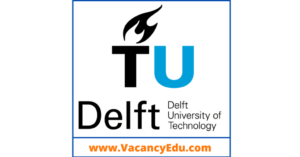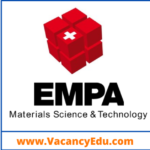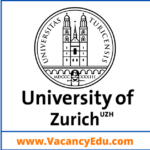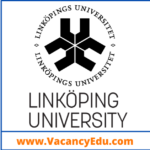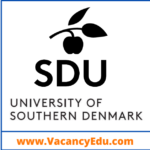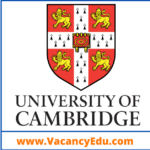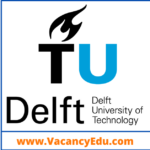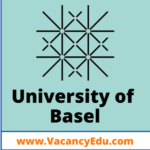Delft University of Technology (TU Delft), Netherlands invites online Application for various Postdoctoral Fellowship in their different Departments. We are providing a list of Postdoc Fellowship positions available at Delft University of Technology (TU Delft), Netherlands.
Eligible candidate may Apply as soon as possible.
(01) Postdoctoral Fellowship Position
Postdoc Fellowship Position summary/title: PostDoc Position in Quantum Networks
Deadline : Open Until Filled
(02) Postdoctoral Fellowship Position
Postdoc summary/title: PostDoc 3D super-resolution microscopy
The postdoc position is part of the ERC-Advanced Project Nanocubic of prof. Sjoerd Stallinga, in which we target 3D super-resolution microscopy by breakthrough designs of illumination patterns that are sequentially projected into the sample volume, together with advanced image reconstruction techniques. We strive for isotropic resolution on the 100 nm scale in standard fluorescent samples and 1 nm in single-molecule imaging based techniques. The envisioned advances in microscopic imaging further open the nanoscopic world for scientific exploration. The project builds on the lab’s track-record in the field of computational imaging techniques for super-resolution microscopy.
Deadline : 15 May 2024
Looking for more Postdoctoral Positions Click Here
(03) Postdoctoral Fellowship Position
Postdoc Fellowship Position summary/title: Postdoc Design of Multi-Modal Pixelated Capacitive Sensor Chip for E-nose
Deadline : 1 may 2024
(04) Postdoctoral Fellowship Position
Postdoc Fellowship Position summary/title: Postdoc Microengineered Devices for Organ-on-chip Platforms
Organ-on-chip technology is revolutionizing the potentiality of in-vitro models to become realistic recapitulations of in-vivo (patho)physiology, thus revoluzionizing pre-clinical drug development and screening. Most human organs and tissues have received an organ-on-chip treatment, whereby the engineered tissues and miniature organs are embedded in realistic synthetic microenvironments providing stimulation and continuous monitoring. A great variety of organ-on-chip devices is therefore available to tailor the technology to the specificities of the organs. However, such variety should not hamper the capacity to interconnect the devices and their ease of use. Modular organ-on-chip platforms are convenient vehicles to combine the variety of organs-on-chip under a standard user interface, as particularly represented by the Smart Multi-Well Plate developed in the European Moore4Medical program.
As part of a multi-partner follow-up European project, this research work will focus on developing microengineered devices for the next generation of the Smart Multi-Well Plate. The envisioned devices include microelectrodes arrays and other microfabricated solutions for electrical monitoring of tissue conditions, by means of transepithelial electric resistance and impedance spectroscopy measurements. In collaboration with the international project partners, the research will enable the exploration of innovative design solutions compatible with system constraints and requirements, the fabrication of the prototype devices, their functional characterization, and their integration within the next Smart Multi-Well Plate embodiment. The goal will be to extend and complement the functionality of the Smart Multi-Well Plate and hence demonstrate its suitability to successfully run models of a selected set of organs.
Deadline : April 30, 2024
(05) Postdoctoral Fellowship Position
Postdoc Fellowship Position summary/title: Postdoc Scaling Interconnects for Ultra High-Throughout Chip Assembly
Current assembly processes utilize high-speed robotic systems to pick, place and bond microelectronic components at the right position. Aggressive downscaling of the size of the components supporting forthcoming applications requires corresponding updates in size, composition and fabrication of their interconnects. In this project we work on novel interconnect technology to enable reliable ultra high-troughput assembly of microcomponents.
We look for a post-doctoral researcher that will investigate the scaling behavior of interconnects. Challenges include the identification of suitable metallurgy, the reproducible fabrication of the interconnects, and modeling of their properties. The results of the project are expected to lead a new machine that will revolutionize current assembly processes, reducing their cost and environmental impact. You will collaborate with both academic and industrial scientists and engineers, and benefit from prior insight to develop the new technology.
As a postdoc you will be involved in the design, fabrication and characterization of the novel interconnects, while also contributing to building fundamental understanding in their scaling behavior. You will closely collaborate with 1 PhD student. The work is expected to result in multiple scientific publications.
Deadline : April 30, 2024
Click here for “Postdoc Application Cover Letter Template”
Click here to know “How to write a Postdoc Job Application or Email”
(06) Postdoctoral Fellowship Position
Postdoc Fellowship Position summary/title: Postdoc Improved Electron Microscopy of Increasingly Small Semiconductors
Deadline :17 April 2024
(07) Postdoctoral Fellowship Position
Postdoc Fellowship Position summary/title: Postdoc Interaction of Hydraulic Polymetallic-Nodule Collectors with the Seabed Sediment
Aiming for a carbon-free future, societies steadily move toward electric transport and machinery utilizing renewable energy. Consequently, there is an increased demand for critical materials such as copper and cobalt to realize such energy sources. Since the terrestrial mineral deposits are depleting, the deep-sea floor has recently been receiving great attention from industrialists and scientists. Immense amounts of strategic metals and rare-earth elements are embedded into the ocean floor, particularly in potato-sized concretions termed polymetallic nodules. These nodules are rich in crucial metals such as cobalt, copper, manganese, and nickel, and companies are keen to get their hands on these nodules.
Hydraulic Coandă-effect-based collectors are most widely considered, because of their indirect contact with the seabed. However, such collectors disturb the seabed; sediment is inevitably picked up and collected together with the nodules during the mining process. The collected sediment is discarded at the rear of the collector. Consequently, a sediment plume is formed, which could travel long distances away from mining sites, disrupting aquatic ecosystems in their track.
The current understanding of the interaction between Coandă-effect-based collectors and the seabed sediment remains scant. The available approach to predict seabed disturbance is through empirical relations. The aim of this postdoctoral position is to improve these relations leading to a more unified physical understanding of the interaction between the collector and seabed sediment. To this end, computational fluid dynamics (CFD) simulations will be run and validated with recently-acquired experimental data. Following that, data-driven and sparse identification techniques will be applied to discover the underlying physics.
Deadline : 17 April 2024
(08) Postdoctoral Fellowship Position
Postdoc Fellowship Position summary/title: Postdoc CFD Membraneless Water Electrolysis
Hydrogen generated from green electricity in water electrolysers is destined to play a prominent role in the energy transition away from fossil fuels. A main source of inefficiency is the membrane. By flowing through porous electrodes in opposite directions, the hydrogen gas can be separated from the oxygen, without a membrane. Without a membrane, the electrodes can be brought closely together to create microfluidic devices with very low electric resistance. This makes it possible to use electrolytes that have only limited conductivity, opening up the way towards purifying various industrial wastewater streams while at the same time making hydrogen.
Within a European consortium of several universities and a microfluidics company, MacGhyver (https://greenhydrogen-pathfinder.eu/), you will work on simulations of several innovative prototypes. To optimize these, computer simulations can be very useful (https://spectrum.ieee.org/eden-tech-water-treatment). Computational Fluid Dynamics will allow identifying dead zones in which bubbles tend to nucleate, something you may simulate with two-fluid multiphase flow models. Multiphysics simulations in e.g. COMSOL or Fluent will allow you to simulate the electric fields and current distributions, allowing optimization of more complex geometries.
You will be part of a lively research group (http://jwhaverkort.weblog.tudelft.nl) consisting of a nice mix of experimental and computational students, PhDs, and postdoctoral researchers. Occasional work visits or consortium meetings to the collaborative partners are foreseen. An experimental PhD project is running in parallel, which will allow you to walk away from your computer into the lab and directly compare your results to experiments. Within Delft there is a flourishing community of researchers working on various types and aspects of electrolysis (https://www.tudelft.nl/e-refinery)
If you are enthusiastic to use your skills in CFD to help the energy transition, we look forward to meet you and work on this challenging topic together.
Deadline : April 15th, 2024
Click here to know “How to Write an Effective Cover Letter”
(09) Postdoctoral Fellowship Position
Postdoc Fellowship Position summary/title: Postdoc on Nonlinear Oscillators
Nanomechanical resonators made of two-dimensional (2D) materials, such as graphene, have been long believed to be the devices of choice for high-performance force and mass measurement. The limit of detection, defined as the smallest frequency shift that can be resolved with these devices, is intrinsically linked with frequency fluctuations which is one of the least understood problems in nanomechanical sensing. Many different mechanisms have been proposed as the underlying root cause of frequency fluctuations, among which the role of nonlinearities has been the least known. In this project, our goal is to engineer resonant sensors with optimal frequency stability. To achieve this, we plan to use nonlinear dynamic phenomena such as internal resonance to quench noise and enhance the stability of the 2D sensors. The project will combine theoretical and experimental nonlinear dynamics and will focus on fabrication, testing, and characterization of 2D nonlinear oscillators to tame frequency noise and obtain breakthrough nanomechanical performance.
The vacant position is in the Dynamics of Micro and Nanosystems (DMN) group. The group focuses on exploiting dynamics of small-scale systems to create technologies that can lead to new products in the fields of scientific instrumentation, consumer electronics and healthcare. Our research spans from measuring and manipulating materials at the micro and nano scale, to the design of world-class MEMS and NEMS sensors and actuators.
You will be working in an international environment in one of the leading technical universities of Europe, with access to state-of-the art micro-nano testing facilities and advanced numerical modelling tools. You will be contributing to a challenging topic related to a European Research Council (ERC) Consolidator grant together with a team of 3 PhD students and 2 postdocs.
Deadline : 15 April 2024
Connect with Us for Latest Job updates
(10) Postdoctoral Fellowship Position
Postdoc Fellowship Position summary/title: Postdoc Physics and Nonlinear Dynamics of Microswimmers in Confinement
Microswimmers like motile bacteria operate in a regime of mechanics where fluid viscosity dominates inertia. In this regime, motility enables them to move around, exploit their environment, avoid toxins and locate favourable habitats. It is well-known that flagellum driven microswimmers, follow a swimming pattern that closely resembles random-walk. Yet, it has been found that when these swimmers move close to a rigid surface, they can re-orient their motion and be guided by the boundaries. In this project, we aim at understanding and revealing the new phenomena that can be observed from motion and interaction of microswimmers in confined environments. We will also seek designing micro devices with which we can control their motion. We eventually plan to use the new designs together with the recent developments made at TU Delft on using graphene-based nanomotion technology for fast drug screening.
The vacant position is in the Dynamics of Micro and Nanosystems (DMN) group. The group focuses on exploiting dynamics of small-scale systems to create technologies that can lead to new products in the fields of scientific instrumentation, consumer electronics and healthcare. Our research spans from measuring and manipulating materials at the micro and nano scale, to the design of world-class MEMS and NEMS sensors and actuators.
Deadline : 15 April 2024
(11) Postdoctoral Fellowship Position
Postdoc Fellowship Position summary/title: Postdoc Distributionally Robust Control
Recent developments in sensing and communication technology offer unprecedented opportunities by ubiquitously collecting data at high detail and at large scale. Utilization of data at these scales, however, poses a major challenge for control systems, particularly in view of the additional inherent uncertainty that data-driven control signals introduce to systems behavior. In fact, this effect has not been well understood to this date, primarily due to the missing link between data analytics techniques in machine learning and the underlying physics of dynamical systems.
The goal of this project is to address this issue by proposing a novel control design paradigm embracing ideas from the emerging field of distributionally robust optimization (DRO). DRO is a decision-making model whose solutions are optimized against all distributions consistent with given prior information. Recent breakthrough work, among others by the PI of this proposal, has shown that many DRO models can be solved in polynomial time even when the corresponding stochastic models are intractable. DRO models also offer a more realistic account of uncertainty and mitigate the infamous post-decision disappointment of stochastic models.
Deadline : 31 March 2024
Polite Follow-Up Email to Professor : When and How You should Write
(12) Postdoctoral Fellowship Position
Postdoc Fellowship Position summary/title: Postdoc Sustainability of PV
The current transition towards using renewable energy implies a transition towards the increased demand of different raw materials as well. How can the supply of sufficient materials for solar panels, batteries, etc. be met to scale renewable energy technologies with such low environmental impact that we keep below 1.5 degrees warming and reach a CO2 neutral society by 2050?
In this research line, we aim at contributing to the development of circular PV. We are part of the winning bid of three European Projects to develop the next generation of advanced silicon solar cells. We are looking for PostDoc to lead our efforts in the sustainability work packages covering life cycle assessment, supply and circularity evaluation for the PV technologies under development.
You will work with Malte Vogt and Olindo Isabella in the Photovoltaic Materials and Devices (PVMD) group as part of the Electrical Sustainable Energy (ESE) department. The program of the PVMD group builds up expertise in the design and fabrication technology from solar cells to PV systems with their power electronics and storage options. The ESE department’s research activities aim at accelerating the energy transition towards sustainable energy. You will contribute to the climate action program in theme II on climate change mitigation in the flagship project “Materials for circular renewable energy technologies”.
Deadline : March 31st 2024
(13) Postdoctoral Fellowship Position
Postdoc Fellowship Position summary/title: Postdoc Data- and Physics-based Identification of Soft Tissue Mechanics
It is widely recognized that unbalanced deformation and loading of cardiovascular tissues leads to pathological growth and remodeling processes. Therefore, quantification of the tissue’s in vivo stress state holds important clinical diagnostic and prognostic opportunities in the management of cardiovascular disease. Unfortunately, data sparsity, parameter uncertainty, and the highly nonlinear and anisotropic behavior of these tissues pose significant challenges to the accurate identification of the in vivo stress state. In this project, you will explore inverse data-driven and physics-based approaches and integrate multi-modal and multi-fidelity biomechanics tissue testing data to advance insights into the ex vivo and in vivo mechanical behavior of various cardiovascular tissues.
As a postdoctoral researcher, you will help us design and run research line involving PhD and MSc students. You will develop novel data-driven and physics-based modeling techniques, conduct and analyze experimental studies, write scientific articles, present your work at (inter)national conferences, and support educational activities.
The research will be conducted in the Faculty of Mechanical Engineering at Delft University of Technology (TU Delft) under the joint supervision of Dr. Mathias Peirlinck (Dept. of BioMechanical Engineering) and Dr. Sid Kumar (Dept. of Material Science and Engineering). More information on both groups can be found at https://peirlincklab.com and https://www.mech-mat.com/. We offer a 15-month contract and will support you in the preparation and acquisition of follow-up funding.
Deadline :29 March 2024
(14) Postdoctoral Fellowship Position
Postdoc Fellowship Position summary/title: Postdoc Digital Twin-based Prognostics for Wind Turbine Blade Preventive Maintenance Decisions
There is a rapid increase in the size of wind turbine rotor blades, and a continuous stream of new blade models is being introduced to the market. However, there are concerns regarding the durability of large rotor blades, and new failure mechanisms are being observed. This is a widespread issue in the industry, which has significant implications for both blade manufacturers and windfarm operators. The advancement of modelling, condition monitoring techniques, and data analytics enables the creation of a digital twin of the rotor blade. The main challenge lies in accurately characterizing the failure mechanisms in the structural model, estimating the remaining useful life, and effectively utilizing this information in the operation and maintenance of offshore windfarms.
This PostDoc position offers a unique opportunity to work within the recently awarded HER+ ReliaBlade 2 project, which aims at improving the reliability of wind turbine rotor blades by monitoring their structural health throughout the lifetime. To achieve this, a digital twin framework fed by measurements from blade-mounted sensors is developed to obtain real-time information about the blade structural health and remaining useful life. Within the ReliaBlade 2 project, a unique opportunity is available for a passionate and highly motivated researcher to work on digital twin driven prognostics for predictive maintenance decision-making.
Deadline : 28 March 2024
(15) Postdoctoral Fellowship Position
Postdoc Fellowship Position summary/title: Postdoc Model-based control of Soft Objects and Robots
We seek a postdoctoral researcher for a project on model-based control of deformable mechanical systems (objects, soft robots). This role involves advancing theoretical models and methods and validating these approaches experimentally – with the ultimate goal of generating a leap forward in the capability of robotic systems to handle complex deformations.
Candidates should have a robust background in control theory, nonlinear dynamics, or machine learning as applied to robotics. Publications in these fields are an advantage.
We aim to offer a platform for researchers to grow in a multidisciplinary and supportive environment. This position will allow you to grow as a researcher, preparing you for different aspects of your next steps in the academic journey. Your responsibility will include coordinating project activities, including supervising master’s students and mentoring junior Ph.D. students, ensuring a collaborative and productive research environment. You will have the opportunity to interact with stakeholders in and out of academia and see your developments applied in real-world contexts.
Deadline : March 25, 2024
(16) Postdoctoral Fellowship Position
Postdoc Fellowship Position summary/title: Postdoc Multi-robot Mobile Manipulation in Human-Centered Environments
Mobile robots are not yet capable of seamless interaction in human populated environments, primarily due to the high complexity of modeling and reasoning over the effect that robot actions have on other robots and humans, and the inherent uncertainty. Humans rely on intuition, namely the ability to understand interaction instinctively, without the need for conscious reasoning. The goal of this project is to provide mobile robots with the ability to reason about their coordination with other agents and the associated risks, take appropriate actions and continuously reassess.
In this project we will take a holistic view on the interaction of mobile robots and humans, where we will consider multiple spatio-temporal granularities ranging from individual interactions to the interaction of a robot fleet with the humans in a city, and from short term (local) to long term (global) effects of the interaction. You will work on motion planning for mobile manipulation and together with two PhD students, you will integrate intuition models in uncertainty-aware trajectory optimization methods to compute safe interaction-aware trajectories for mobile robots.
Thus, you will make a fundamental contribution towards intuitive multi-robot interaction, making it possible for teams of mobile robots to safely interact in human-centric environments and enabling a new level of automation in factories and cities.
You will work on the ERC Starting Grant project “Intuitive Interaction for Humans among Robots (INTERACT)” and be embedded within the Autonomous Multi-Robots Lab in the Department of Cognitive Robotics at TU Delft.
Deadline : 25 March 2024
Top 16 Tools for Researchers in 2022
(17) Postdoctoral Fellowship Position
Postdoc Fellowship Position summary/title: Postdoc Risk-aware Autonomous Navigation
While automation offers opportunities to make society safer, it comes with new risks, some of which are fundamental and, others more technological. Autonomous agents require an understanding of how humans respond to the uncertainty and risk that they bring. From the agent’s perspective, actions are taken to bring itself into safety if there are uncertainties, but this may introduce new risks for others. For example, a vehicle that comes to a stand- still at a strange location, or reduces speed for a green traffic light, has already resulted in accidents, simply because this does not match human expectations. It is a major challenge to develop agents and frameworks that account for uncertainty, risk and interaction in the way humans do.
As human behavior depends on a tightly controlled perception-action cycle that carefully considers uncertainty and risk, so should the behavior of an autonomous agent. But this is not trivial to attain. For example, the dynamics of the environment in which it operates can be unpredictable, and control options may be unavailable or have limited ability. Inspired by how human brains deal with uncertainty, in this project you will develop probabilistic frameworks for motion planning in autonomous agents, such as cars or teams of drones. We will work on a fundamental understanding of how autonomous agents can cope with uncertainty and provide means for computing performance guarantees of autonomous AI agents under uncertainty, which will be integrated to various degrees into a use-case with self-driving shuttles.
Deadline : 25 March 2024
(18) Postdoctoral Fellowship Position
Postdoc Fellowship Position summary/title: Postdoc Data-driven prediction of human body motion in automated vehicles
The potential discomfort and motion sickness experienced by passengers during automated journeys pose a significant challenge to their widespread adoption. Envisaged automated vehicle (AV) designs and their driving behavior are expected to provoke motion sickness and discomfort, hindering passengers’ ability to enjoy their commute time. Despite substantial investments in AV technology, the importance of motion comfort has been largely overlooked. Fundamental questions regarding occupants’ postural control (when and how they are activated) in AVs remain unanswered, which has led to the lack of human body models (HBM) able to predict human motion and postural control (both anticipatory as preparation for upcoming perturbation, and compensatory for restoring balance after perturbation).
To model human motion, researchers have employed simplified efficient models, which are faster to run than complex human body models and useful for early-stage design evaluations. However, these simplified models may fail to capture the intricacies of the human body’s response to motion. Advanced active human body models offer highly detailed information but require specialized expertise and significant computational time. Furthermore, neither type of model adequately captures occupants’ anticipatory and compensatory postural control based on upcoming or experienced motion.
Deadline : Open Until Filled
About Delft University of Technology (TU Delft), Netherlands –Official Website
Delft University of Technology, also known as TU Delft, is the oldest and largest Dutch public technical university. Located in Delft, Netherlands, it is consistently ranked as one of the best universities in the Netherlands, and as of 2020 it is ranked by QS World University Rankings among the top 15 engineering and technology universities in the world.
With eight faculties and numerous research institutes, it has more than 26,000 students (undergraduate and postgraduate) and 6,000 employees (teaching, research, support and management staff).
The university was established on 8 January 1842 by William II of the Netherlands as a Royal Academy, with the primary purpose of training civil servants for work in the Dutch East Indies. The school expanded its research and education curriculum over time, becoming a polytechnic school in 1864 and an institute of technology (making it a full-fledged university) in 1905. It changed its name to Delft University of Technology in 1986.
Dutch Nobel laureates Jacobus Henricus van ‘t Hoff, Heike Kamerlingh Onnes, and Simon van der Meer have been associated with TU Delft. TU Delft is a member of several university federations, including the IDEA League, CESAER, UNITECH International and 4TU.
Disclaimer: We try to ensure that the information we post on VacancyEdu.com is accurate. However, despite our best efforts, some of the content may contain errors. You can trust us, but please conduct your own checks too.
Related Posts
- Postdoctoral Fellowship (03) at EMPA, Zurich, Switzerland

- Postdoctoral Fellowship (14) at University of Zurich, Switzerland

- Postdoctoral Fellowship (04) at Maastricht University, Netherlands

- Postdoctoral Fellowship (09) at Groningen, Netherlands

- Postdoctoral Fellowship (05) at Linkoping University, Sweden

- Postdoctoral Fellowship (17) at University of Southern Denmark, Denmark

- Postdoctoral Fellowship (28) at University of Cambridge, United Kingdom

- Postdoctoral Fellowship (13) at Delft University of Technology (TU Delft), Netherlands

- Postdoctoral Fellowship (09) at University of Basel, Switzerland


